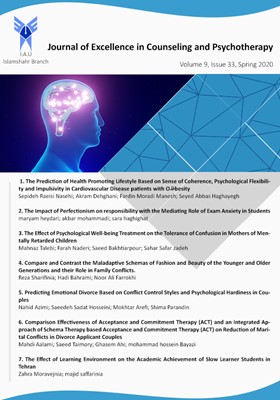The Impact of Perfectionism on responsibility with the Mediating Role of Exam Anxiety in Students
Subject Areas : Journal of Excellence in Counseling and Psychotherapymaryam heydari 1 , akbar mohammadi 2 , sara haghighat 3
1 - PhD Student in Educational Psychology, Faculty of Psychology, Islamic Azad University, Garmsar Branch, Semnan, Iran.
2 - Assistant Professor, Department of Educational Psychology, Faculty of Psychology, Islamic Azad University, Garmsar Branch, Semnan, Iran,
3 - Assistant Professor, Department of Educational Psychology, Faculty of Psychology, Islamic Azad University, Garmsar Branch, Semnan, Iran
Keywords: perfectionism, responsibility, Exam anxiety,
Abstract :
Purpose: The purpose of this study was to investigate the impact of perfectionism on responsibility with the mediating role of exam anxiety in students. Methodology: In terms of purpose, this research was an applied research. The statistical population of the present study included all students of the units of the Islamic Azad University of Tehran Province who were studying in the academic year 2017-18. A multi-stage cluster random sampling method was used to select the sample and Based on this, 761 people were selected as the research sample. The research instruments were: Saranson's Exam Anxiety (1984), Felt and Hevit Perfectionism (1991), and California Responsibility (1951), all of which had acceptable validity and reliability. Analysis and analysis of the results of the questionnaires were performed using Spss-V24 and AMOS-V8.8 software at a significant level of 0.01. Structural equation modeling was used to test the research hypotheses. Result: The results showed that perfectionism has an indirect effect on responsibility due to the test anxiety. Perfectionism has a direct effect on responsibility. In addition, Perfectionism has a direct effect on test anxiety. Also, test anxiety has a direct effect on responsibility. In total, the model was acceptable and the corrective model had suitable fit. The results indicated that perfectionism and responsibility play an important role in the test anxiety (P<0.01) Conclusion: Therefore, considering these factors in therapeutic and educational interventions to reduce the test anxiety can be very effective.
_||_


